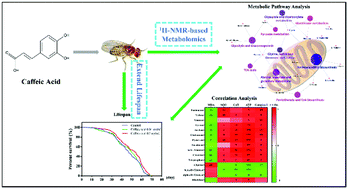Metabolomics profiling reveals the mechanism of caffeic acid in extending lifespan in Drosophila melanogaster†
Abstract
Caffeic acid is a phenolic compound widely synthesized by plants, which has shown health benefits for multiple aging-related diseases. The aim of this study was to investigate the life-extending effect of caffeic acid and its underlying mechanisms. The effects of caffeic acid on lifespan, climbing behavior, starvation resistance, and heat sensitivity of Drosophila melanogaster (D. melanogaster) were evaluated. 1H-NMR-based metabolomics and biochemical detection were performed to explore the potential mechanisms. The results demonstrated that supplementation with caffeic acid extended the lifespan, and improved climbing behavior and stress resistance in D. melanogaster. Additionally, continuous supplementation with caffeic acid caused the metabolic profile of 30-day D. melanogaster closer to that of 3-day D. melanogaster, among which 17 differential metabolites were significantly regulated by caffeic acid, involved in amino acid metabolism and mitochondrial metabolism. Furthermore, caffeic acid significantly prevented oxidative damage and improved mitochondrial function. Correlation analysis indicated that the differential metabolites regulated by caffeic acid were correlated with its antioxidant effect and mitochondrial improvement function. In conclusion, our data support that caffeic acid could extend lifespan in D. melanogaster through regulation of metabolic abnormality and improvement of mitochondrial function.



 Please wait while we load your content...
Please wait while we load your content...